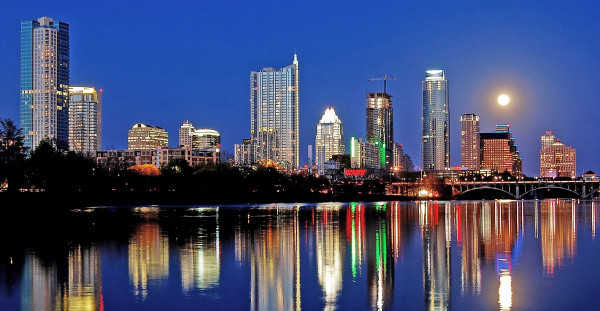
Top Ten United States Smart Cities – Austin, Texas – 4/10
Top Ten United States Smart Cities – Austin, Texas – 4/10
Austin, Texas

Austin has long been Texas’ hub for solar, wind, geothermal, and biomass power, as well as fuel cell technologies. Its commitment to the environment and sustainability has made it not only a national cleantech player, but a global one as well. Austin is home to some of the largest cleantech companies on a global level, including HelioVolt, Xtreme Power, and Green Mountain Energy. A large research and development hub, the University of Texas at Austin has created several research expenditures to elevate research into energy efficiency and renewable energy. This includes a project by the College of Natural Sciences to create biofuel from blue-green algae and hybrid-electric automobile programs developed by TheCenter for Electromechanics. There is also the Clean Energy Incubator, which provides facilities and resources to turn renewable energy ideas into working projects.
Austin is the capital of the US state of Texas and the seat of Travis County. Located in Central Texas, Austin is the 11th-most populous city in the United States and the fourth-most populous city in Texas. It is the fastest growing of the largest 50 US cities.Austin is also the second largest state capital in the United States, after Phoenix, Arizona As of July 1, 2014, Austin had a population of 912,791 (U.S. Census Bureau estimate). The city is the cultural and economic center of the Austin–Round Rock metropolitan area, which had an estimated population of 1,943,299 as of July 1, 2014.
In the 1830s, pioneers began to settle the area in central Austin along the Colorado River. After Republic of Texas Vice President Mirabeau B. Lamar visited the area during a buffalo-hunting expedition between 1837 and 1838, he proposed that the republic’s capital, then located in Houston, be relocated to the area situated on the north bank of the Colorado River near the present-day Congress Avenue Bridge. In 1839, the site was officially chosen as the republic’s new capital (the republic’s seventh and final location) and was incorporated under the name Waterloo. Shortly thereafter, the name was changed to Austin in honor of Stephen F. Austin, the “Father of Texas” and the republic’s first secretary of state.
The city grew throughout the 19th century and became a center for government and education with the construction of the Texas State Capitol and the University of Texas at Austin. After a lull in growth from the Great Depression, Austin resumed its development into a major city and, by the 1980s, it emerged as a center for technology and business. A number of Fortune 500companies have headquarters or regional offices in Austin including Advanced Micro Devices, Apple Inc., ARM Holdings, Cisco,eBay, Google, IBM, Intel, Texas Instruments, 3M, Oracle Corporation and Whole Foods Market. Dell’s worldwide headquartersis located in nearby Round Rock, a suburb of Austin.
Residents of Austin are known as Austinites. They include a diverse mix of government employees (e.g., university faculty and staff, law enforcement, political staffers); foreign and domestic college students; musicians; high-tech workers; blue-collar workers and businesspeople. The city is home to development centers for many technology corporations; it adopted the “Silicon Hills” nickname in the 1990s. However, the current official slogan promotes Austin as “The Live Music Capital of the World”, a reference to the many musicians and live music venues within the area, and the long-running PBS TV concert series Austin City Limits.In recent years, some Austinites have also adopted the unofficial slogan “Keep Austin Weird”. This interpretation of the classic “Texas-style” sense of independence refers to a desire to protect small, unique, local businesses from being overrun by large corporations. In the late 1800s, Austin also became known as the City of the “Violet Crown” for the wintertime violet glow of color across the hills just after sunset. Even today, many Austin businesses use the term “violet crown” in their name. Austin is known as a “clean-air city” for the city’s stringent no-smoking ordinances that apply to all public places and buildings, including restaurants and bars.The FBI ranked Austin as the second-safest major city in the U.S. for the year 2012.
